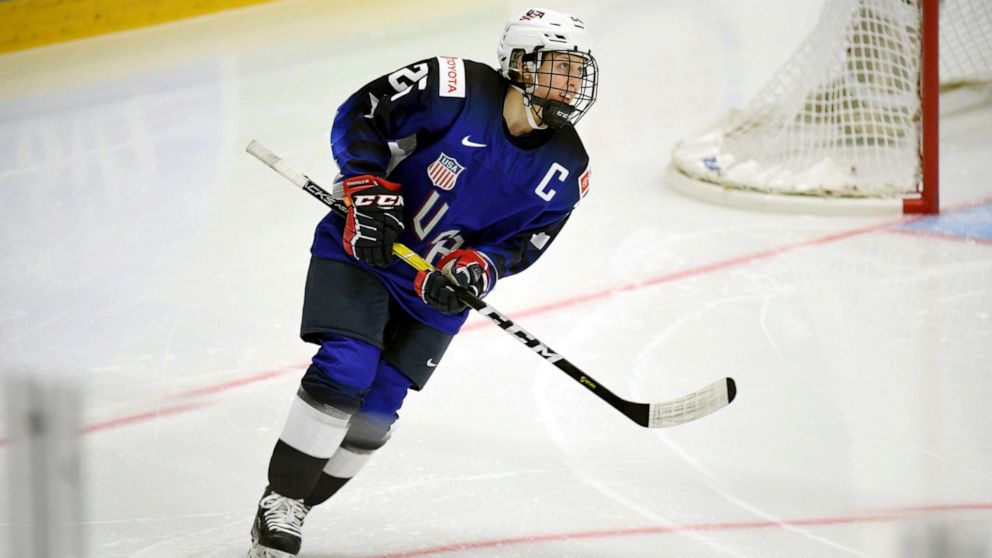


Kendall Coyne Schofield refused to move from Los Angeles to play for the Minnesota Whitecaps, a National Women's Hockey League team.
Instead, the two-time Olympic medalist would fly in for Whitecaps games and fly back to L.A. afterwards, "because I wasn't packing up my life and moving to Minnesota for the money I was getting," she told ABC News.
"The treatment of the players, the way the players are compensated, it's not possible for women to train and prepare to be professional athletes," she said. "And in the current state of the game, there's nothing professional about it."
(MORE: US women's hockey players dominate world competitions, but push for 'one league' back home)So on Thursday, Schofield joined over 200 fellow athletes -- including stars Hilary Knight, Amanda Kessel, Meghan Duggan, Brianna Decker and Jocelyne and Monique Lamoureux -- in announcing that they will not be playing for a professional hockey league this season.
"We cannot make a sustainable living playing in the current state of the professional game," the players wrote in a statement posted across social media. "Having no health insurance and making as low as two thousand dollars a season means players can't adequately train and prepare to play at the highest level."
"This isn't a boycott," Schofield said. "This is a gap year."
For years, women have been calling for "one league" -- a professional league of local teams between the United States and Canada that would function like the National Hockey League, and, preferably, under the NHL's umbrella.
This isn't a boycott. This is a gap year.
Instead, they have competed in two separate professional leagues: the Canadian Women's Hockey League (CWHL) and the National Women's Hockey League (NWHL) in America. Last month, the CWHL announced it was folding, and players saw it as an opportunity to form a unified North American league.
(MORE: #PayDecker: Female hockey star gets $25K after social media campaign)The NHL, however, has been refusing to step in while the NWHL still exists, although they do offer some financial support.
"There is a lot more we need to know before we would be prepared to weigh in at this point," NHL deputy commissioner Bill Daly said in a statement to ABC News on Friday. "The NWHL is an existing league with an existing organization and business plan. We do not intend to interfere with their business or their objectives."
"At the same time, we continue to support the objective of allowing for the opportunity of the best Women Hockey Players in the world to play the sport at the professional level," Daly continued. "We will further explore the situation privately before taking any affirmative position on next steps."
(MORE: Lamoureux sisters had sights set only on women's hockey gold against Canada)For their part, the NWHL released a statement saying they "are among the players' biggest fans" and reflecting an offer of "increased salaries and a 50-50 revenue split from league-level sponsorships and media rights deals."
But the players simply aren't invested in the NWHL. This refusal to play is the culmination of years of unmet demands for better infrastructure for women's and girl's hockey, which, Schofield said, is the fastest growing sport in the nation.
Many demands have been directed at USA Hockey, which manages the national team that competes in the Olympics and international tournaments. In 2017, national team players threatened a boycott of World Championships to push USA Hockey negotiations for fair wages and support. They ultimately competed after a positive agreement was signed.
Now, the professional league players are using their collective efforts to force the issue of creating "one league."
(MORE: US Women's National Team sues soccer's governing body for gender discrimination on International Women's Day)A popular argument against a unified North American women's professional hockey league has been that there's a lack of interest from fans. To that, Schofield says, noting the Canadian and American's international dominance and 2018 ESPY for Best Game, "Do your homework."
"They always say if you build it they'll come, and this is a situation where if a sustainable professional league is built, fans will come," she said. "But fans haven't had an opportunity to see the best product on the ice for professional women's hockey -- yet."